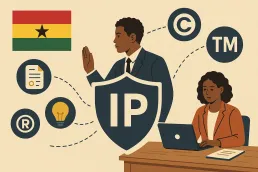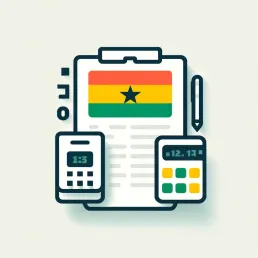Intellectual Property Protection in Ghana: Essential Guide for Businesses
Understanding Intellectual Property Basics
What is intellectual property?
Intellectual property (IP) encompasses the creative output of human intellect, including inventions, literary and artistic expressions, distinctive designs, symbols, names, and images used in commercial activities.
For businesses, IP represents one of the most valuable assets that can drive competitive advantage and long-term success.
Why is intellectual property important for my business?
Whether you're a startup developing innovative technology, an SME building brand recognition, or an investor evaluating portfolio companies, understanding and protecting intellectual property rights is crucial for long-term success and competitive advantage. IP constitutes valuable business assets requiring strategic management and can significantly impact business valuation and competitive positioning.
What laws govern intellectual property protection in Ghana?
Ghana's intellectual property framework operates under the following primary statutes:
- Patents Act, 2003 (Act 657) and Patent Regulations, 1996 (L.I. 1616)
- Copyright Act, 2005 (Act 690) and Copyright Regulations, 2010 (L.I. 1962)
- Trademarks Act, 2004 (Act 664) and Trade Marks Regulations, 1970 (L.I. 667)
- Industrial Designs Act (Act 660)
Patent Protection
What is a patent and what does it protect?
Patents protect inventions that provide technological solutions to identified problems.
It grants the holder exclusive rights to prevent others from making, using, or selling an invention within Ghana for a specified period.
What are the requirements for an invention to be patentable in Ghana?
For an invention to qualify for patent protection in Ghana, it must satisfy four fundamental criteria:
- Novelty: The invention must be entirely new and not previously disclosed to the public. Inventive Step: The invention must be non-obvious to someone skilled in the relevant technical field
- Industrial Applicability: The invention must be capable of being manufactured or utilized in any industry, demonstrating practical commercial value.
- Statutory Eligibility: The invention must not fall into excluded categories.
How long does patent protection last?
Patent protection extends for twenty (20) years from the filing date.
To maintain protection, you must pay annual maintenance fees throughout this period. Patents can be assigned, licensed, or transferred, and patent holders may pursue legal remedies including injunctions and damages for infringement.
Trademark Protection
What is a trademark?
A trademark is any word, symbol, device, sign, or combination that distinguishes your goods or services from those of competitors in commercial transactions. Think of it as your business's unique identifier in the marketplace.
How do I register a trademark in Ghana?
Trademark registration involves filing an application with the Trademarks Registry, specifying the goods or services you want to protect. The application will be examined for distinctiveness of the mark, absence of confusion with existing registrations, compliance with requirements under the Trademarks Act.
How long does trademark protection last?
Registered trademarks receive protection for ten (10) years from the filing date, renewable for consecutive ten-year periods upon payment of prescribed fees.
What can I do if someone infringes my trademark?
Trademark owners may institute civil proceedings for infringement, seeking injunctions, damages, and other remedies.
Trademark rights may also be assigned or licensed subject to statutory requirements.
Copyright Protection
What does copyright protect?
Copyright protects original expressions in literary, artistic, musical, audio-visual, choreographic, derivative works, and computer software programs created by Ghanaians or persons resident in Ghana.
What rights do I have as a copyright owner?
Copyright ownership grants both economic and moral rights over creative works.
How long does copyright protection last?
Protection duration varies according to authorship:
- Individual authors: Life of the author plus seventy years
- Joint authorship: Life of the surviving author plus seventy years
- Corporate authorship: Seventy years from creation or first publication
Strategic Business Considerations
How should I manage my intellectual property assets?
Intellectual property constitutes valuable business assets requiring strategic management.
Proper identification, protection, and exploitation of intellectual property can significantly impact business valuation and competitive positioning.
What due diligence should my business conduct regarding intellectual property?
Businesses must conduct appropriate due diligence to ensure:
- Freedom to operate without infringing existing rights
- Adequate protection of proprietary information
- Compliance with employee confidentiality obligations
- Effective monitoring and enforcement strategies
Can foreign individuals and companies protect their IP in Ghana?
Yes, Ghana's IP laws provide protection for both residents and non-residents.
What happens if I don't protect my IP in Ghana?
Without proper IP protection, you may risk losing exclusive rights to your innovations, brands, or creative works; Competitors freely using your unprotected IP and reduced investment attractiveness
Do I need separate protection for each type of IP?
Yes, different types of IP require separate applications and protection mechanisms.
Can I license my IP rights in Ghana?
Yes, IP rights can be licensed, assigned, or transferred subject to statutory requirements and proper documentation. Licensing agreements and IP transfers should be carefully structured with professional legal assistance to protect your interests and comply with Ghanaian law.
How does IP protection affect investment and business valuation?
Well-protected IP significantly enhances business valuation and investment attractiveness. Investors evaluate IP portfolios when making investment decisions, and strong IP protection provides competitive advantages and revenue opportunities through licensing. A comprehensive IP strategy should align with your business objectives and investment goals.
What can I do if someone infringes my intellectual property rights?
IP rights holders may pursue civil remedies for infringement, including:
- Injunctive relief: Court orders to prevent continued infringement
- Monetary damages: Compensation for losses incurred
- Account of profits: Recovery of profits the infringer gained
- Delivery up or destruction: Removal of infringing materials from the market
Should I consult a lawyer for intellectual property matters?
Early consultation with qualified legal counsel ensures optimal protection strategies tailored to your specific business requirements.
Need Expert Legal Guidance?
Our experienced legal team specializes in intellectual property protection for businesses of all sizes. We help startups, SMEs, and investors navigate Ghana's IP landscape effectively, ensuring your innovations and brands receive the protection they deserve.
Contact us today to schedule a consultation and develop a customized IP protection strategy that aligns with your business objectives and budget.
This guide provides general information regarding intellectual property law in Ghana and does not constitute legal advice for specific circumstances. Professional legal consultation is recommended for particular matters.
Understanding Tax Filing Obligations for Companies in Ghana
Corporate Tax
Companies registered in Ghana are required to pay corporate tax on the company's annual profit. The current corporate tax rate is 25%.
Filing Process for Corporate Tax:
Provisional Assessment: The Company will be provided a provisional assessment of the company's tax liability based on its revenue, as determined by the Commissioner at the start of the financial year. This is an initial assessment that serves as a preliminary estimation.
The taxpayer is required to pay the assessed amount based on the initial assessment in four quarters of the related year.
Preparation of Financials: At the end of the financial year, the Company is required to prepare its financial accounts, including the profit and loss account, balance sheet, and cash flow statement, which should be audited and signed off by an auditor.
Submission of Company Income Tax Return and Financial Statement: The Company is required to submit a Company Income Tax Return along with the financial accounts to the GRA. This return must be completed using the prescribed form and filing is due by April of the following year.
Final Assessment: The GRA issues a final tax assessment based on the submitted financial accounts. Any outstanding tax liabilities must be settled by the company.
Personal Income Tax (P.I.T)
Individuals are required to pay Personal Income Tax (PIT) on the total of their chargeable income, which encompasses all income generated from employment, business or investments less any allowable deductions for the year.
Personal Income Tax is applied based on graduated tax rates rather than a flat rate. This means that the tax payable is dependent on the taxpayer's income. Consequently, higher earnings result in a proportionally higher tax obligation.
Filing Process for Personal Income Tax:
Provisional Assessment: The taxpayer receives a provisional assessment of tax, which is based on an initial evaluation of the individual's chargeable income. This provisional assessment provides an estimated amount that the taxpayer is required to pay.
Submitting an Income Tax Return: at the end of the period, the taxpayer is required to submit an income tax return for the assessment year. This return must be completed using the prescribed form and submitted no later than 4 months after the conclusion of the basis period.
Final Assessment: Upon receiving the return of income and any other relevant information, the Commissioner will proceed to make a final assessment of the taxpayer's chargeable income and determine the tax payable based on this assessment. Any outstanding payments will be communicated to the taxpayer, who is required to settle them promptly.
Pay–As–You–Earn (PAYE):
Employers in Ghana are required to withhold income tax from the wages and salaries of their employees (Pay-As-You-Earn or PAYE) and remit the withheld taxes to the Ghana Revenue Authority. The PAYE tax is graduated depending on the income range.
All employers are also required to file annual returns of employees with the GRA, disclosing income paid to and tax withheld from each employee, within four months of the end of the calendar year.
Filing Process for Pay–As–You–Earn (PAYE)
Employers are required to deduct Pay As You Earn (PAYE) from the monthly salary of each employee.
The accumulated PAYE amount for the month is to be remitted to the Ghana Revenue Authority (GRA) at the end of the month.
Employers must fill out and submit monthly PAYE deductions returns along with a schedule detailing the names and Ghana card numbers of employees and the corresponding amounts paid. Payment of the amount due must be paid to the GRA.
Consequences for Non-Compliance
Companies that fail to comply with their tax filing obligations within the stipulated timeframe become liable to administrative penalties for the duration that the default continues.
By understanding the filing requirements, adhering to deadlines, and seeking appropriate legal assistance, companies can ensure compliance with Ghanaian laws and avoid potential penalties for non-compliance.
For more information on how we can assist your company in meeting regulatory requirements and ensuring compliance with the law, please contact us at contact@olaryealaw.com / +233 (0)201068192.

